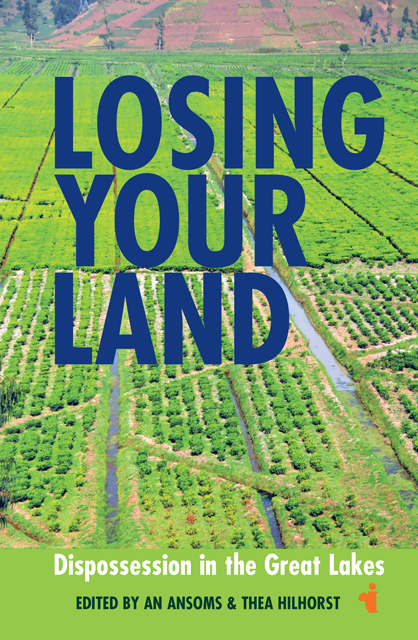Book contents
- Frontmatter
- Contents
- List of Illustrations
- Notes on Contributors
- Acknowledgements
- List of Abbreviations & Acronyms
- 1 Introduction: Causes & Risks of Dispossession & Land Grabbing in the Great Lakes Region
- 2 Land Grabbing & Development History: The Congolese Experience
- 3 This Land is My Land: Land Grabbing in Ituri (DRC)
- 4 Land Grabbing by Mining Companies: Local Contentions & State Reconfiguration in South Kivu (DRC)
- 5 Competition over Soil & Subsoil: Land Grabbing by Local Elites in South Kivu (DRC)
- 6 The Continuities in Contested Land Acquisitions in Uganda
- 7 Land Grabbing & Power Relations in Burundi: Practical Norms & Real Governance
- 8 Land Grabbing & Land Tenure Security in Post-Genocide Rwanda
- 9 The Reorganization of Rural Space in Rwanda: Habitat Concentration, Land Consolidation & Collective Marshland Cultivation
- 10 ‘Modernizing Kigali’: The Struggle for Space in the Rwandan Urban Context
- Conclusion
- Index
4 - Land Grabbing by Mining Companies: Local Contentions & State Reconfiguration in South Kivu (DRC)
Published online by Cambridge University Press: 24 February 2023
- Frontmatter
- Contents
- List of Illustrations
- Notes on Contributors
- Acknowledgements
- List of Abbreviations & Acronyms
- 1 Introduction: Causes & Risks of Dispossession & Land Grabbing in the Great Lakes Region
- 2 Land Grabbing & Development History: The Congolese Experience
- 3 This Land is My Land: Land Grabbing in Ituri (DRC)
- 4 Land Grabbing by Mining Companies: Local Contentions & State Reconfiguration in South Kivu (DRC)
- 5 Competition over Soil & Subsoil: Land Grabbing by Local Elites in South Kivu (DRC)
- 6 The Continuities in Contested Land Acquisitions in Uganda
- 7 Land Grabbing & Power Relations in Burundi: Practical Norms & Real Governance
- 8 Land Grabbing & Land Tenure Security in Post-Genocide Rwanda
- 9 The Reorganization of Rural Space in Rwanda: Habitat Concentration, Land Consolidation & Collective Marshland Cultivation
- 10 ‘Modernizing Kigali’: The Struggle for Space in the Rwandan Urban Context
- Conclusion
- Index
Summary
Introduction: mining, land grabbing and politics in the DRC
Large-scale foreign direct investments in land are not new, as Peemans demonstrates in this volume. Foreign investors and concessions granted to multinational companies were crucial in the mise en valeur of ‘vacant lands’ in the nineteenth and early twentieth centuries (Vellut, 1983). More recently, a ‘new [resource] scramble for Africa’ has been observed (Southall and Melber, 2009), targeting primarily oil and mineral-rich regions. As such resources are in high demand and becoming scarcer, multinationals continue to prospect for reserves and are seeking to gain and secure access to strategic mineral and energetic resources in more risk-prone environments.
Risk is a reality and, according to Price Waterhouse Coopers (PWC, 2011: 1), ‘projects become more complex and are typically in more remote, unfamiliar territory’. These ‘unfamiliar territories’, in which mining companies find it difficult to operate, are often inhabited by local communities who make their own claims to the land. They frequently clash with multinational mining companies over issues such as land use, dispossession, relocation, environmental pollution, degradation of communities’ resources, human rights abuse and the loss of livelihoods (Hilson, 2002: 68; Ballard and Banks, 2003: 289). Such contestations are now occurring all over the world, as demonstrated in case-studies from Australia (O’Faircheallaigh, 1995), Papua New Guinea (Banks and Ballard, 1997; Hilson, 2002), Peru (Bury, 2004), Ghana (Hilson and Yakovleva, 2007; Aubynn, 2009; Bush, 2009), Tanzania (Carstens and Hilson, 2009) and the DRC (Geenen and Claessens, 2013; Hönke, 2013).
The DRC is known for its large reserves of mineral resources, including over 10 per cent of the world’s copper and 49 of the world’s cobalt reserves, situated mostly in the underground of the province of Katanga (USGS – United States Geological Survey, 2009). Moreover, the province of Kasai holds a considerable share of the world’s diamond reserves and the eastern provinces host substantial reserves of coltan (tantalum ore), cassiterite (tin ore) and gold, although these are hard to estimate because few geological surveys have been conducted (World Bank, 2008).
Since colonization, the Congolese economy has relied extensively on the industrial exploitation and export of raw materials (Bezy, Peemans and Wautelet, 1981; Geenen, 2011a). Mining companies such as ‘Union Minière’ in Katanga governed their vast concessions as private domains.
- Type
- Chapter
- Information
- Losing your LandDispossession in the Great Lakes, pp. 58 - 81Publisher: Boydell & BrewerPrint publication year: 2014
- 10
- Cited by



